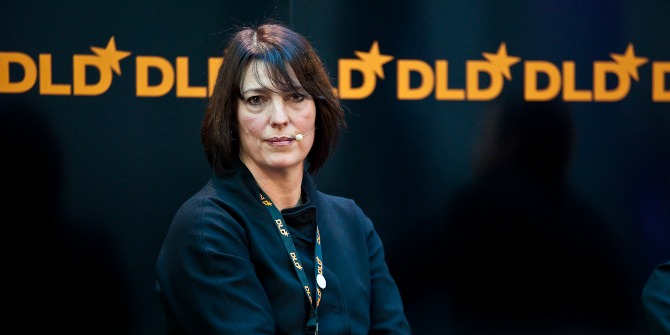The Friedmanite view on business still reigns supreme. But who deals with the negative externalities of doing business? Is a car company liable for the CO2 emissions it enables? Is a consumer goods company responsible for the tropical forest farmers cut down to meet the multinational’s demand? Is a financial company liable for the wealth inequality it creates? Peter Vanham asks these and more questions as he discusses the morality of business.
For Paul Polman, the former CEO of Unilever, the ultimate question for business leaders is this: is the world better off because your business is in it? It’s a simple question, with a straightforward yes-or-no answer. Yet, according to Polman and his co-author Andrew Winston, who just published the book “Net Positive”, it is vital. It defines whether a business should – and will – exist at all in the future.
For them, talking about the purpose and morality of business is as natural as talking about growth and profits. In fact, they say, the former should take precedence over the other. “It’s time to wake up from our fifty-year zombielike obsession with profits,” they write. “Shareholder value should be a result, not an objective.” Instead, companies should be “courageous”, and work to have a positive impact on society and the planet.
The authors are convinced that their viewpoint, however radical, will be vindicated in the not-so- distant future. Already in this decade, the UN’s Sustainable Development Goals will become the true compass for companies, they believe. They have the credentials: Polman led Unilever for 10 years and did so in the image of the “net positive” philosophy. It is hard to ignore when such a prominent business voice speaks out. But are they right? Are morality and purpose the new profit and growth?
Despite decade-long calls for change, talking about the moral duties and purpose of a company in business schools and many board rooms remains an oddity. Discussing growth strategies and profit goals are much more familiar territory for most business leaders. The reason for that is the Friedmanite view on business, which still reigns supreme. “The only social responsibility of business is to increase its profits”: that remains true if you go by many B school curricula.
In one poignant example, then MIT-Sloan MBA-student John Benjamin (who since graduated) summarised his experience as follows in a New Republic article: “Business school instruction is routinely blinkered in this way. An MBA class will consider a business issue in isolation. Its challenges are delineated; its society-level implications are waved away. The principals’ overriding goal—profit maximisation—is assumed.”
It’s not hard to see why this idea has had such staying power, from Adam Smith to Milton Friedman. Freedom, and with it, the idea of free markets has been an economic ideal since the Industrial Revolution. In the 19th century, incorporating a company was a tool in the fight against monarchical, monopolistic regimes. In the 20th century, Western free markets won out against communism’s state-control and planning. Absolved from any further purpose, only profit maximisation remained.
But in this century, we are finding out that when freedom is the ultimate ideal and businesses are encouraged to be amoral in their pursuit of growth and profits, dealing with negative externalities and market failures becomes difficult. “Our current economic system has two fundamental weaknesses,” Polman and Winston argue. “It’s based on unlimited growth on a finite planet, and it benefits a small number of people, not everyone.”
In the face of these shortcomings, even the most rabid proponent of focusing only on growth and profits would have to admit at some point that the free market has failed. Indeed, what is the case for doing business on a dead planet, Polman and Winston ask rhetorically? How can businesses thrive in societies that fail? These dead-end questions are the clearest indication for the two business thinkers that the purpose of business needs to change.
“To believe that shareholder value is all that matters, and that free markets will solve everything, you need to believe in multiple fairy tales, including the demonstrably false idea that markets function seamlessly, with perfect information flows and perfect competition.” They drive the point home. It’s as damning an analysis of shareholder capitalism as one can imagine. And it bears repeating: Polman isn’t just theorising. He led the world’s second largest consumer goods company for a decade.
So, what is the better approach, according to the Dutchman and the American? Most importantly, business aim should be to contribute positively to the world. It should have a positive purpose. And this is where the pay-out part of being morally upright comes in: doing good, Polman and Winston believe, ultimately leads to doing well. At Unilever under Polman’s leadership, the authors write, “purpose-driven brands have grown 69 percent faster than the rest of the business with higher margins.”
As more companies see this strategic advantage, they believe, being a “net positive” company will become the norm, and a virtuous circle will start: being net positive will pay off for business, investors will demand it, technology will allow it, and young people will want to see it. Already now, they say they believe “more companies have failed because of short-termism, than have tripped up because they were too visionary”. (Admittedly, they don’t provide evidence for that claim.)
It leads to a first point of reflection. Putting those “beliefs” of the “net positive” thinkers, next to the “fairy tales” of the Friedmanites, though, reveals some similarities. Critics of the so-called environmental, social and corporate governance trends – to which the “Net Positive” authors subscribe (they believe ESG to be necessary but not enough) – have pointed out that it too, is grounded more in beliefs than in facts. The notion that ESG outperforms the market is disputed.
Moreover, even if we assume rewards are awaiting companies that do the right thing, the fact remains that they are still a minority among global business today. Will the turnaround happen quickly enough? “The world lacks enough moral leadership,” Polman acknowledges. “Business executives have been playing it too safe and avoiding conflict on tough social, and environmental issues. That’s wrong, strategically and morally.”
There’s a second catch, too. Once morality comes into play for businesses, uncomfortable questions about the responsibility companies have for their indirect impact emerges as well. Is a car company liable for the CO2 emissions it enables among its consumers? Is a consumer goods company responsible for the tropical forest farmers cut down to meet the multinational’s demand? And I could add: is a financial company liable for the wealth inequality it creates?
Being a moral leader compels you to answer yes. And that leads to a very difficult acknowledgement of one’s true impact on society and the planet. A few years ago, environmental consultancy firm TruCost calculated that “none of the world’s top industries would be profitable if they paid for the natural capital they use”. That’s the most inconvenient truth of all for businesses. It’s also a sober realisation for all of us who thought humanity made a lot of progress in the past century.
Polman remains defiant in the face of those hard truths. In fact, he even leans into them. “We cannot shy away from the biggest of challenges, the ones that society increasingly expects business to help solve,” he and Winston write. So yes, we must even look at the “truly heretical” questions, Polman muses. That includes the hardest questions of all for consumer goods companies like Unilever: “how much stuff do we really need?”
“A tiny number of companies have been willing to pose these heretical questions,” Polman and Winston claim. “Patagonia famously said ‘don’t buy this jacket’ in a Christmas ad; Dutch airline KLM ran a campaign asking people to fly less. IKEA is launching a buy-back scheme for some used furniture, and Eileen Fisher, founder of the apparel company, said ‘We think maybe we don’t have to sell so many clothes.’”
In listing such examples, Polman and Winston reach near-philosophical heights, leaning deeper and deeper into the existential challenges we face. But to their credit, they stop short of arguing for “degrowth”. “If your company can produce a circular or regenerative product, then please grow,” they write. “We want companies to be around for a long time, and that’s difficult to do by shrinking.” I think they are right. It’s inherent to humans to want to grow in all kinds of ways during their lives.
What does remain, though, is their call for morality in business, and their conviction that it will ultimately lead to a better, more sustainable form of capitalism. “Can you find the moral leadership to do what we must?” they ask. “You’ll make mistakes. But the rewards are enormous, for you, for your business, and for all of us living together on this spinning, imperfect ball.” Good things come to those who do what is right.
Or will it? Time will tell. But Polman and Winston have one thing going for them: unlike many other business leaders and thinkers, they dare to face the music. In the end, every business and political leader will need to do this. Doing so mustn’t lead to financial ruin: you can make profits and be net-positive – that’s the conclusion of the book. But action is needed: the issues of climate and inequality won’t disappear on their own – however many fairy tales anyone believes in.
♣♣♣
Notes:
- This blog post expresses the views of its author(s), not the position of LSE Business Review or the London School of Economics.
- Featured image by Medi2Go, under a Pixabay licence
- When you leave a comment, you’re agreeing to our Comment Policy.






Thank you for the article, it is informative.